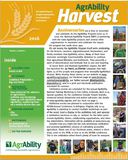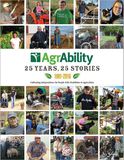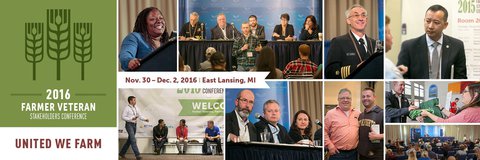National AgrAbility Project News
 Purdue University has been chosen by the USDA/NIFA to administer the 2016-2020 National AgrAbility Project (NAP) grant. This special edition of the e-Note is being sent to communicate the high points of the new NAP work plan for the next four years and to make sure readers are aware of a couple of key conferences/workshops being held the end of November, 2016. Click here to view the USDA press release on the grant award.
Purdue University has been chosen by the USDA/NIFA to administer the 2016-2020 National AgrAbility Project (NAP) grant. This special edition of the e-Note is being sent to communicate the high points of the new NAP work plan for the next four years and to make sure readers are aware of a couple of key conferences/workshops being held the end of November, 2016. Click here to view the USDA press release on the grant award.
Due to restrictions on announcing the award we have not been able to confirm or deny the grant status until now. We apologize for being so non-responsive on this issue over the past couple of months. The entire NAP staff looks forward to pressing ahead with the approved work plan which is summarized below.
There will also be an AgrAbility All-Staff Meeting on November 28 at 3:00 ET to discuss the new grant cycle and related issues. Check your email for details.
NAP Personnel
- NAP/Purdue Project Director, Bill Field
- NAP/Purdue Project Manager, Paul Jones
- NAP/Purdue Assistive Technology Specialist, Stephen Swain
- NAP/Purdue Veteran Outreach Coordinator, Cindy Chastain
- NAP/Purdue Special Populations Outreach Coordinator, Chuck Baldwin
- NAP/Purdue Information Technology Specialist, Richard Fox
- NAP/Purdue Technology Outreach Coordinator, Shawn Ehlers
- Goodwill of the Finger Lakes AgrAbility Coordinators, JoBeth Rath and Tess McKeel
- APRIL (Association of Programs for Rural Independent Living) staff, Billy Altom and Sierra Royster
- Colorado State University Evaluation Specialist, Robert Fetsch, and staff
- Brian F. French, evaluation consultant/professor at Washington State University
- Edward W. Bell, consultant farmer & AgrAbility customer
- Steve K. Etheridge, retired VR counselor and VR consultant
- Carla S. Wilhite, occupational therapy consultant/professor at University of New Mexico
NAP Work Plan
The NAP work plan addresses six program goals:
- Education
- Networking
- Direct Assistance
- Marketing
- Evaluation
- SRAPs' Sustainability
Highlights of Goal 1: Education
 The AgrAbility National Training Workshop (NTW) will continue much as it has in the past. The 2017 NTW will have primary leadership from Goodwill of the Finger Lakes in collaboration with and AgrAbility NTW Committee, Purdue's Conference Division, and a host SRAP - which has yet to be confirmed.
The AgrAbility National Training Workshop (NTW) will continue much as it has in the past. The 2017 NTW will have primary leadership from Goodwill of the Finger Lakes in collaboration with and AgrAbility NTW Committee, Purdue's Conference Division, and a host SRAP - which has yet to be confirmed.
The NAP will conduct two AgrAbility regional workshops per year. The first regional workshop each year will be directly planned by Goodwill of the Finger Lakes. For the second annual regional workshop, the NAP will offer financial and organizational support to a coalition of at least two SRAPs and one non-SRAP state willing to coordinate the event.
Educational outreach to the 1890 and 1994 land grant institutions will include two AgrAbility workshops on campuses of the 1890s and one at a 1994 institution the first year, and will be reevaluated in the following years.
The NAP will continue its outreach to veterans through a variety of veteran-focused initiatives and its Veteran Outreach Coordinator. A day-long track will be dedicated to veterans' issues at the NTW, and such issues will also be incorporated in the the regional workshops.
 The www.agrability.org website will continue to be updated and new resources will be added. SRAP resources will be added to the password-protected "extranet" as they become available for the existing pages of marketing, staff-specific resources, and evaluation materials/statistics.
The www.agrability.org website will continue to be updated and new resources will be added. SRAP resources will be added to the password-protected "extranet" as they become available for the existing pages of marketing, staff-specific resources, and evaluation materials/statistics.
AgrAbility's Toolbox Assistive Technology Database will be updated more frequently and new products and ideas will continue to be collected and added.
The AgrAbility Webinar Series will continue, with six webinars to be held each year. Purdue/BNG will focus on topics such as veterans' issues, worksite issues, and assistive technology; Goodwill will conduct sessions on disability-related topics such as visual impairment and traumatic brain injury; APRIL will focus on the five core services of CILs; and consultant Steve Etheridge will conduct VR-related sessions.
A three-day web conference, the Virtual NTW, consisting of approximately six webinars, is planned to be held annually in late fall or winter.
 The AgrAbility Harvest newsletter will be published annually with 100 print copies given on a complimentary basis to each SRAP. It will also be posted online and sent to mailing lists.
The AgrAbility Harvest newsletter will be published annually with 100 print copies given on a complimentary basis to each SRAP. It will also be posted online and sent to mailing lists.
During the new four-year grant cycle, the NAP will continue to build on the foundation of veterans' resources started during the last cycle. In the first year, the NAP video, The Next Mission: Breaking Down Barriers for Veterans in Agriculture, is scheduled to be completed and posted on YouTube so that the NAP and SRAPs can utilize it when talking with veterans. It is anticipated that copies will be replicated on USB drives, with two being supplied to each SRAP, in addition to an option for downloading from www.agrability.org. On the same website, the veterans resource page will continue to be updated to include new resources. A brochure for veterans interested in agriculture is to be developed, shared electronically with the SRAPs and other organizations, and printed for use as a handout.
Over the course of the first two years of the new grant cycle, the NAP will begin developing a simplified worksite assessment tool and enhanced training resources. These are to include several short videos related to conducting a worksite assessment. If development options appear feasible, the NAP will develop an app or mobile version.
![]() The NAP will continue to update its specialized technical resources and plans to produce at least one new technical resource per year during the last three years of the grant cycle. Topics under consideration include farming with a joint replacement and machinery access.
The NAP will continue to update its specialized technical resources and plans to produce at least one new technical resource per year during the last three years of the grant cycle. Topics under consideration include farming with a joint replacement and machinery access.
Consultant Brian French will initiate a working group composed of NAP and SRAP staff members to continue identifying and providing training and resources for core competencies. A session on core competencies will be held at each NTW. Any products, printed resources or education modules, will be posted on the NAP website.
Highlights of Goal 2: Networking
The NAP will network through its funded collaborating partners, Goodwill of the Finger Lakes and APRIL, and its unfunded collaborators, to enhance awareness of AgrAbility, and to improve AgrAbility's service to clients.
There will also be intra-AgrAbility networking between the NAP and the SRAPs to facilitate the NAP's primary function of providing support to the SRAPs. Much of this will be done via the AgrAbility listserv, teleconferences/web meetings, the e-Note, and quarterly all-staff meetings.
Networking will continue to be carried out through Communities of interest (COI's) and working groups. The NAP will launch a new working group dedicated to SRAP financial sustainability which will meet quarterly via teleconference or web interface.
The NAP will be networking with targeted audiences which hold special interest and networking potential for AgrAbility. These groups include the Cooperative Extension Service, Vocational Rehabilitation, veterans and organizations serving them, 1890 and 1994 land-grant institutions, major agricultural organizations and corporations, Hispanic/Latino farmers, ranchers, and farmworkers, and rehabilitation professionals.
Highlights of Goal 3: Direct Assistance
While the primary goal of the NAP is to support the SRAPs, it also provides limited, on-demand SRAP-type services in geographic areas without SRAPs. This assistance is given through a variety of methods:
Web-based assistance through the NAP website.
Toll-free help line answered by BNG during office hours and by Goodwill of the Finger Lakes' call center during all other hours. Referrals will be made to appropriate agencies, including VR, and relevant resources will be sent when feasible.
Individual requests via email by the NAP for customers from non-SRAP states, and by referral to SRAPs for customers in SRAP states.
Direct assistance through educational events such as the NTW, regional AgrAbility workshops, APRIL-sponsored events, and workshops sponsored by unfunded collaborating organizations.
AgrAbility "Associate Projects." There are currently six AgrAbility "Affiliate Projects" - states that previously had AgrAbility grants, lost their funding, but still provide limited AgrAbility services. In addition, professionals in states that have never held AgrAbility grants - most recently Connecticut and Alabama - have also expressed interest in providing AgrAbility-related direct assistance. These could be known as AgrAbility "Associate Projects." The NAP will explore what types of training would be necessary for never-before-funded states to be considered AgrAbility Associate Projects. Based on findings from Year 1, the NAP will proceed with training and approving "Associate Projects" or discontinue this effort.
Highlights of Goal 4: Marketing
Marketing to increase AgrAbility's visibility to widespread audiences will be accomplished through:
 Electronic and print media such as the NAP website, social media (Facebook, Twitter, YouTube), development of a new AgrAbility video, AgrAbility 25-year summary, and an AgrAbility poster.
Electronic and print media such as the NAP website, social media (Facebook, Twitter, YouTube), development of a new AgrAbility video, AgrAbility 25-year summary, and an AgrAbility poster.
Marketing training - The NAP will provide marketing education to the SRAPs via multiple training venues such as a marketing-related session at the NTW, direct marketing through public awareness events, events in the agriculture and rehabilitation communities, and marketing initiatives via NAP subcontractors (Goodwill and APRIL).
Highlights of Goal 5: Evaluation
Appropriate program evaluation is essential to providing overall direction to AgrAbility, improving services offered by the NAP and SRAPs, and justifying the need for program funding. The AgrAbility Evaluation Committee (AEC) will continue to appraise assistance outreach efforts, outcomes of those efforts in farmers and ranchers being served, and effectiveness/impacts of AgrAbility assistance on the lives of farmers, farm workers, and family members with disabilities who are being served by the program.
During year 1 of the grant cycle, to make a successful transition from Dr. Fetsch to a new AEC Chair, he and AEC will network with the NAP, NIFA, and other evaluation stakeholders to create a four-year transition process to find, coach, and prepare the next AEC Chair. In years 2-4, the identified individual will work directly with Dr. Fetsch and gradually assume more of his responsibilities.
The NAP, in cooperation with Dr. Fetsch and the AEC, will work on expanding data access and security. They will write a codebook and a sustainable QOL database that is housed in a secure place that will maintain the integrity of the data and be accessible to others. The book will be distributed to SRAPs when completed.
Brian French will administer the Annual Staff Needs Assessment in a web survey format to every SRAP staff member during the fall of each year. Results will be summarized, provided to the NAP, SRAPs, and USDA, and discussed during all-staff teleconferences and at the NTW.
Each SRAP is responsible for reporting basic statistics about the customers they serve, including such data as disability type, farm enterprise, gender, etc., used to help reflect the general scope of AgrAbility's service provision. The NAP will develop a new web portal for the SRAPs to use in inputting their demographic data. Categories will have expanded explanations of their meanings. The SPOC will collect SRAP demographic data via the web portal. Statistics will be quantified, analyzed, and provided to the USDA, the NAP, and the SRAPs.
Evaluations of specific workshops, such as the NTW and regional workshops, will be carried out so that the NAP will have data about the quality of its educational training. Event agendas will be modified in response to SRAP input, thereby enhancing the quality as reflected by increased evaluation scores.
The NAP and the AEC will collaborate to develop an effective means of evaluating NAP services to customers in non-SRAP states.
CSU will publish at least four external publications related to some aspect of project evaluation during the grant cycle. These efforts will increase AgrAbility exposure in professional literature and related publications.
The NAP will provide NIFA with an annual web traffic report.
The NAP Advisory Team will continue to meet in-person annually, as this has proven to be a useful external mechanism for evaluating the effectiveness of NAP activities, engaging in long-term planning, and functioning as a forum for valuable networking. Conference calls and/or web meetings will also be conducted at least twice annually.
Highlights of Goal 6: SRAPs Sustainability
The expert panel that convened in July will continue to meet via conference call and/or web meeting on a quarterly basis to continue drafting a strategic plan. Additional members from SRAPs will be solicited. Output will be posted on the extranet section of www.agrability.org for SRAP use and updated when appropriate.
In addition to a strategic plan, the SRAPs will benefit from continued training and discussions related to sustainability strategies. Sustainability sessions will continue to be offered annually at the NTW. At least one all-staff web meeting per year will be dedicated to the topic of sustainability. At least two webinars during the grant cycle will be dedicated to sustainability. The expert panel will also be charged with devising additional training options for SRAPs.
The expert panel will continue to explore costs and benefits of an AgrAbility foundation and a membership organization.
The NAP will continue to seek funding for AgrAbility activities from such organizations as CHS Foundation, Monsanto, Farm Credit, and Farmer Veteran Coalition. Support of travel stipends for farmers to attend the NTW will be a priority. The NAP will also continue recruiting Advisory Team members who can help with such efforts.
It is important to sustain talent within the NAP and SRAPs and cultivate new talent to achieve program continuity in a cost-effective manner. The expert panel will discuss mentoring programs to pair seasoned AgrAbility staff members with newer staff and make recommendations for SRAP succession planning. The NAP will encourage student participation in the NTW through stipend opportunities. SRAPs will be challenged to create succession plans for maintaining program continuity.
State and Regional AgrAbility Project News
Due to the late date of the NAP grant announcement, the normal September and October e-Notes were not able to be published on time. The September e-Note will be published as soon as possible, and Chuck Baldwin, NAP's e-Note coordinator, will send out an invitation for submissions toward a combined October/November e-Note to be published mid-November. For those who have already sent submissions for an October e-Note, Chuck will use what you have submitted and add anything else you wish to send for the Oct./Nov. e-Note. All others may combine their activities from both September and October and send them to Chuck for the Oct./Nov. e-Note.
Upcoming Events
Farmer Veteran Coalition Stakeholders Conference
 Farmer Veteran Coalition will host the third annual Farmer Veteran Stakeholders Conference—United We Farm—November 30 to December 2, 2016 at Michigan State University in East Lansing, Michigan.
Farmer Veteran Coalition will host the third annual Farmer Veteran Stakeholders Conference—United We Farm—November 30 to December 2, 2016 at Michigan State University in East Lansing, Michigan.
For the third consecutive year, farmer veterans from across the nation will come together for the largest gathering of the military and agricultural communities for three days of educational tracks, farm visits, guest panels, distinguished speakers, community and camaraderie building, and much more. Hosted at Michigan State University’s spacious Kellogg Hotel & Conference Center, the conference unites farmer veterans with the agricultural, governmental and nonprofit groups that support them. To read the complete press release, click here.
For more information on the agenda, registration and accommodations, please visit: http://www.farmvetco.org/fvsc/
AgrAbility 1890s Workshop at Florida A&M University
 An AgrAbility workshop focused on the 1890 land grant institutions will be held November 30 - December 1, 2016, at Florida A&M University (FAMU) in Tallahassee, FL.
An AgrAbility workshop focused on the 1890 land grant institutions will be held November 30 - December 1, 2016, at Florida A&M University (FAMU) in Tallahassee, FL.
The goal is to enhance the relationships between AgrAbility and the 1890 land-grant institutions. By attending this workshop, participants will be made aware of means and resources that are available to them to help agricultural workers with disabilities among their constituencies. They will also have the opportunity to meet and talk with farmers who have benefited from AgrAbility, and the occasion to speak with other 1890 leaders about how their institutions are collaborating with AgrAbility projects.
There is no registration fee to attend and meals during the event will be provided along with a variety of relevant resources. For the first 30 registered attendees traveling more than 50 miles, one night of lodging will also be provided. Participants' only expense will be their own transportation.
Please encourage all Extension personnel within driving distance of FAMU to attend this important event. More information will be forthcoming. For any questions, please call or write Chuck Baldwin, NAP's 1890s liaison, at 574-306-7329, or baldwi19@purdue.edu.
Problems? Contact Chuck Baldwin, National AgrAbility Project, baldwi19@purdue.edu
